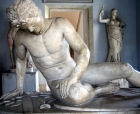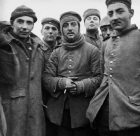Whole School
As part of a broad and balanced curriculum, history should find a place at the heart of school life, providing enrichment through trips and projects, through cross-curricular links and through whole school activities such as assemblies. In this section you will find resources and guidance to ensure history enjoys a high profile across the whole school.
Sort by:
Date (Newest first) | Title A-Z
Show:
All |
Articles |
Podcasts |
Multipage Articles
-

A creative Egyptian project
ArticleClick to view -

A history of the world - 100 objects that tell a story
ArticleClick to view -

Assessment and Progression without levels
ArticleClick to view -

Bring on the iPad revolution
ArticleClick to view -

Case Study: Creative chronological thinking
ArticleClick to view -

Case Study: Historical information and the local community
ArticleClick to view -

Chronology through ICT
ArticleClick to view -

Diogenes: Creativity and the Primary Curriculum
ArticleClick to view -

Doing history in the early years and foundation stage
ArticleClick to view -

Early Islamic civilisation
ArticleClick to view -

English Heritage's Heritage Explorer
ArticleClick to view -

From Home to the Front: World War I
ArticleClick to view -

Helping pupils to view historical film critically
ArticleClick to view -

History and the curriculum
ArticleClick to view -

History, ICT and the digital age
ArticleClick to view -

Ideas for Assemblies - Remembrance
ArticleClick to view -

Ideas for Assemblies: Anniversaries
ArticleClick to view -

Ideas for Assemblies: Lest we forget
ArticleClick to view -

Ideas for Assemblies: historical events
ArticleClick to view -

Ideas for Assemblies: the role of the international community in the First World War
ArticleClick to view

